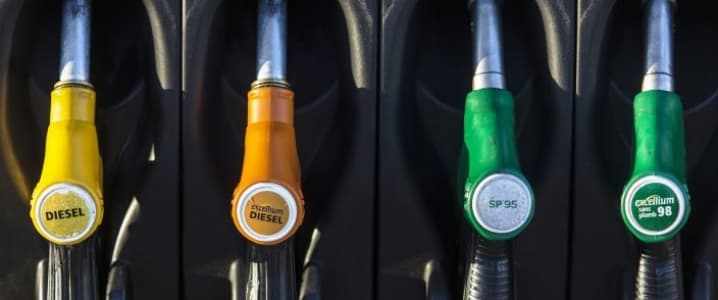It's become typical for gas prices to spike before and after major hurricane landfalls. The national average gasoline price jumped more than 30 cents per-gallon in the week following Hurricane Harvey and Hurricane Irma could produce acute supply shortages for Florida and much of the Southeast for the rest of September.
At first, the reasons for these spikes seem fairly straightforward. A disproportionate percentage of the nation’s refining capacity is located along the Texas and Louisiana Gulf Coast, while a just-in-time fuel inventory system means gas stations run out quickly in parts of United States when a serious disruption occurs. The supply disruption during Hurricane Harvey was made worse by the flooding-related shutdown of the main pipeline that moves 2 million barrels a day of gasoline and diesel from the Gulf Coast to the East Coast.
But there's another largely invisible reason for the price spikes. Gas prices would be lower today in most parts of the United States were it not for shipping restrictions enshrined in a 97-old-year shipping law called the Jones Act, which strictly prohibits the free flow of trade by water between U.S. states.
The 1920s-era law requires sea trade between any U.S. ports to be carried on U.S.-built ships that are U.S.-owned, U.S.-flagged and with a crew made up of at least 75 percent U.S. citizens. These restrictions have, over time, shrunk the U.S. oceangoing merchant-marine fleet to the point that it’s now just 5 percent of the size it was in 1960. The number of oceangoing U.S.-flagged tankers available to transport petroleum products along the Atlantic and Pacific coasts has fallen from 422 to 53 during the same time period, even as the country's demand for crude and petroleum products more than doubled. Related: Can Putin Bring Peace To The Korean Peninsula?
These rules create a highly protected and inflexible shipping market that makes it difficult in times of disruption to find available vessels for emergency cargos.
Like clockwork, refiners last week started asking the federal government for waivers to allow foreign-built tankers to ship cargoes of oil and fuel. Federal waivers for foreign shipping were given in the aftermath of Hurricanes Katrina and Rita in 2005; during the 2011 Libyan civil war, when crude oil from the Strategic Petroleum Reserve (SPR) was released; and after Hurricane Sandy in 2012.
On Sept. 8, federal authorities waived the Jones Act to allow expedited supply of gasoline to Florida, but the action is coming too late to help evacuees from gasoline-starved South Florida trying to escape Hurricane Irma.
Because the U.S. gasoline market tightly aligns demand and supply, when disruptions occur, no region of the country is left unaffected. Normal supplies to some parts of the country are diverted to areas of shortage, thus increasing scarcity pricing elsewhere. According to GasBuddy.com, 18 states saw average gas prices rise by more than 30 cents per-gallon in the Harvey's aftermath, with Delaware and New Jersey seeing prices jump 40 cents a gallon. States as far away as Washington and Alaska saw per-gallon price increases of 6 and 7 cents, respectively.
The most damaging and easy-to-correct of the Jones Act's restrictions is the requirement for only U.S.- built ships, which causes U.S. shippers to pay four to five times more than ships built in Asia or Europe. Ship owners then pass the vessel’s higher capital costs on to customers. Studies show the cost per barrel to ship crude or refined products from the U.S. Gulf to East Coast is $6 per barrel in U.S. ships, but only $2.00 a barrel in a foreign-flagged ship to eastern Canada, even though the distance travelled is several hundred miles farther.
This restriction is no different than an American airline being banned from purchasing a passenger plane built by France’s Airbus, Canada’s Bombardier or Brazil’s Embraer, or a commercial truck driver banned from purchasing a Swedish-made Saab 18-wheeler. Boeing and other U.S. aircraft manufacturers would surely build inferior and more costly airplanes if commercial aerospace were the same sort of protected market.
Such disregard for consumer choice and the normal workings of a market economy would never be accepted in any other part of the U.S. economy. The shipping industry continues to operate under this extreme protectionism because of perceived benefits to a small number of shipyards and shipyard workers across the country. Related: Will Hydrogen Break The Battery Market?
Some studies show the Jones Act’s restrictions are equivalent to a 65 percent tariff on domestic saltwater shipping, which in turn indirectly supports higher rail-shipment and commercial trucking costs, not just during hurricane season but all year round. These costs can be seen in the differences in shipping costs between U.S. and foreign shippers.
So, remember that the next time you fill up your car. The hurricane-related price spike you’re paying is in part the result of outdated laws regarding maritime commerce, which serves as a drag on the U.S. economy whether it’s hurricane season or not.
By William Murray via Rstreet.org
More Top Reads From Oilprice.com:
- World’s Largest Car Market Turns To Electric Vehicles
- Russia’s Rosneft Expects $40 Oil In 2018
- Goldman: Harvey, Irma Cause 900,000 Bpd Drop In Demand



















So yes, the Jones Act may have the effect of "forcing" America to buy American, and hire American, but at the end of the day, isn't that the best case scenario, and what we should be doing anyways? It's actually a sad fact that we have to make it a law that we look out for the interests of the "lowly American" and provide an income and a life for hundreds of thousands of Americans thanks to the Jones Act.
Please, in the future, assuming that you are an American, don't bash or hate on regulations that are in place to ensure that at least some of your American brothers and sisters will have a job in an industry that is as exciting as the ocean itself.
Kind Regards,
Josh Raines, 2nd Mate Unlimited Tonnage, United States Merchant Marine